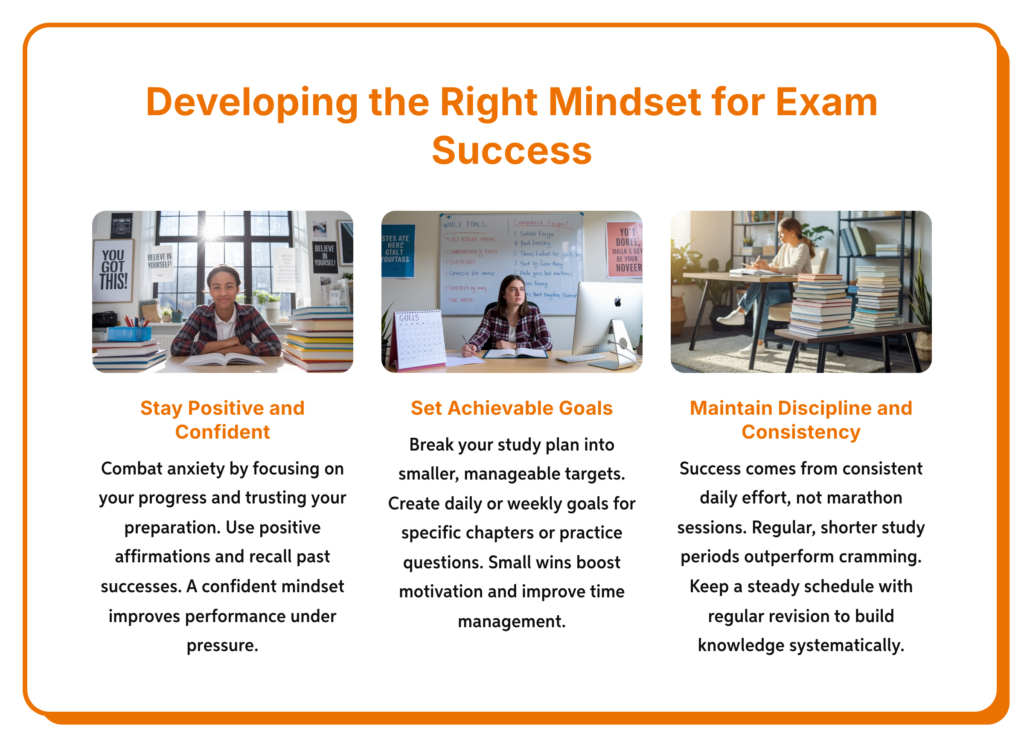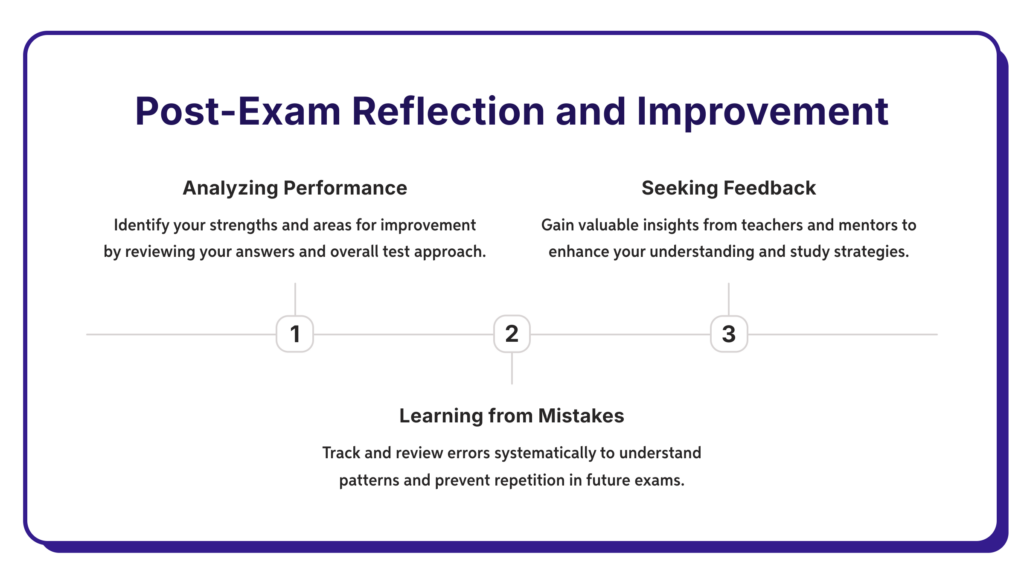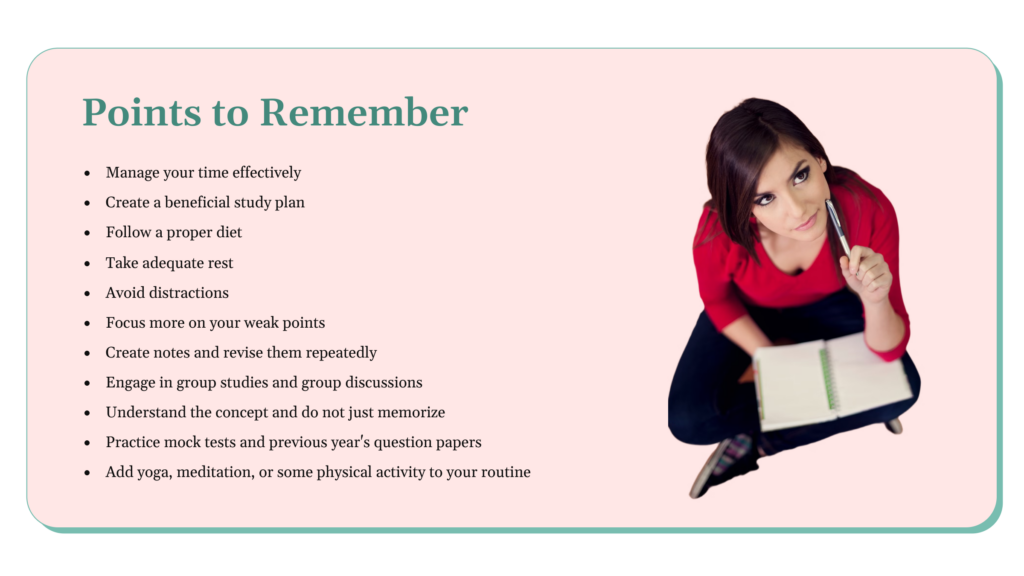
Quick Summary
Table of Contents
During the academic year, the one thing that the majority of students fear the most is exams. This fear stems from the idea that exam results will majorly influence their future and career. Consequently, they spend most of their time figuring out how to get good marks in exams.
In today’s competitive world, extensive study is unimportant, but brilliant study is. Students need to learn several life skills, such as time management, concentration, note-making, revising, etc., apart from studying to ensure their success. While getting good marks is not everything, it helps you gain unbeatable confidence and showcases your expertise in your field of study.
A wrong approach to examinations and preparation can prevent students from getting the desired results or marks. Therefore, to help students achieve their desired scores and get good marks in exams, we have curated a list of the 10 most effective and proven ways to score well.

Proven techniques for effective exam preparation include regular revision, breaking down the syllabus, practicing past papers, staying organized, and managing stress. Focus on understanding the material, take breaks, get enough sleep, and maintain a healthy diet. Here are some effective strategies on how to get good marks in exams-
If you wonder how to learn fast for exams, mnemonics is the answer. Remember, when you were a child, your teachers and parents used to help you memorize via rhymes and songs? Do you still remember all those rhymes? This suggests how powerful mnemonics are for memorizing something.

Paying attention in class is key to exam success. Front benchers often perform better because they engage fully with the material, which helps retain information long-term. Teachers use effective methods, and staying focused in class reduces the need for extra study at home.
When we attend a lecture and understand everything, we think all the information will stay with us forever. However, when we leave the classroom often, most of the facts we hear or learn about also leave our minds instantly. Therefore, it is better to make notes.
Cramming is not the solution, but revising is. Whenever you are studying an important concept, you don’t need to grasp it when you read it for the first time. The answer to how to study effectively for exams lies in continuous revision.
Revising your syllabus 3-5 hours per day is enough to permanently ensure the concepts and knowledge are vested in your mind. The more you revise, the more clarity you gain on each aspect of your syllabus, and the need for cramming is eliminated!
Apart from theoretical subjects or topics, several elements, such as equations, problems, etc., need regular practice. You must create a practice plan for such issues depending upon your strong and weak points.
How to get good marks in exam? You must take breaks between your study schedule to rejuvenate your mind and start preparation afresh every time.
No matter what level of education you are at or what exam you are preparing for, giving mock tests and previous year question papers is a must. It helps you practice in real-time in an intuitive environment to understand what giving an actual exam would feel like. Also, this will help you acquire skills such as time management and ensure that you attempt the question paper in the best possible way.
While giving mock tests, remember to use a timer or stopwatch. Based on your experience giving mock tests, create an exam plan that you will use to take the actual exam.
Again, we are focusing on the fact that cramming never solves any problem. Most students try to find shortcuts on how to learn quickly for exams. When you cram, you tend to remember an answer for a day or, at maximum, a week. But when you understand a concept, you can write an answer explaining the same for the next few years.
Also Read: How To Study for Long Hours: Smart Study Habits and Tips
Effective time management is crucial for exam preparation. Balance study time with proper diet, rest, and physical activity for optimal results. If you have additional commitments like a part-time job, use time-management strategies such as creating schedules and prioritizing tasks to maximize your study time.
A healthy body and mind are crucial for effective exam preparation. Eating nutritious meals and staying hydrated boosts brain function and cognitive skills. Key foods like green leafy vegetables, berries, almonds, tea, and fatty fish enhance brain power and concentration, helping you prepare and perform better during exams. Avoid caffeine as it can have long-term negative effects.
Smart study planning and time management can greatly affect how well you prepare for exams. Organizing your study time properly instead of rushing through topics at the last minute will help you stay focused, reduce stress, and improve retention.
Create a Study Schedule
A well-structured study schedule keeps you on track and ensures you cover all subjects in time. Plan your study sessions by allocating specific time slots for each subject. Stick to your schedule and avoid distractions during study hours. A balanced routine prevents last-minute panic and improves productivity.
Prioritize Subjects and Topics
Not all subjects require the same amount of effort. Identify your strong and weak areas and focus on topics that need improvement. If a subject is challenging, dedicate extra time to it while ensuring you don’t neglect the others. Prioritizing topics helps you use your time effectively and gain confidence in difficult subjects.
Use Time Management Techniques
Studying for long hours without breaks can lead to burnout. Instead, try time management techniques like the Pomodoro Technique (study for 25 minutes, take a 5-minute break) to maintain focus. The Eisenhower Matrix helps prioritize urgent and important tasks, making study sessions more efficient.
Avoid Last-Minute Cramming
Cramming the night before an exam can increase stress and reduce retention, making it harder to recall information when needed. Instead, focus on consistent revision over time. Regular practice and spaced repetition are key techniques that enhance long-term memory retention, ensuring that you remember concepts more effectively during exams.
If you’re wondering how to get good marks in exams, the answer lies in effective study planning and time management. By following a well-structured study routine, staying organized, and avoiding last-minute stress, you can prepare more efficiently and perform better on exam day.
Studying isn’t just about reading textbooks and taking notes about understanding, remembering, and applying what you learn. Many students struggle with forgetting information right after studying, making revision feel like an endless cycle. But with the right study techniques, you can retain information more effectively and make learning easier. Here are some proven methods to boost memory and improve exam performance.
1. Use Active Learning Methods
Passive reading is one of the least effective ways to learn. Instead of just going through textbook pages, try active learning methods that engage your brain and improve recall.
Effective Active Learning Techniques:
Active learning forces your brain to retrieve information, strengthening memory and understanding.
2. The Feynman Technique: Teach to Learn
One of the best ways to test your understanding is to teach the concept to someone else. The Feynman Technique helps simplify complex topics by explaining them in simple words.
How to Use the Feynman Technique:
You ensure deep learning rather than surface-level memorization by breaking down concepts into easy-to-understand explanations.
3. Spaced Repetition: Review Smartly, Not Repeatedly
Cramming everything the night before an exam might seem helpful, but it’s one of the least effective study habits. Spaced repetition helps you retain information long-term by revisiting topics at increasing intervals.
How to Use Spaced Repetition:
This method prevents forgetting and strengthens memory by gradually reinforcing knowledge.
4. Make Notes Effectively: Write to Remember
Simply copying from textbooks won’t help much. Effective note-taking helps in organizing and recalling information better.
Best Practices for Note-Taking:
Well-structured notes become valuable revision tools instead of just pages of text.
5. Self-Study vs. Group Study: Find What Works for You To Get Good Marks In Exam
Some students prefer studying alone, while others learn better in groups. Understanding when to use each method can make a big difference.
Self-Study: Tips for exams
Group Study:
Using a mix of both can provide the best learning experience.
6. Create a Distraction-Free Study Environment
Even the best study techniques won’t work if you’re constantly distracted. Find a quiet place to study where you can focus without interruptions.
Tips for Better Focus:
A structured environment improves focus, making study time more productive.
7. Relate Information to Real-Life Examples
Memorizing dry facts is tough, but connecting concepts to real-life examples makes them easier to remember.
How to Apply This Technique:
When concepts feel relevant, they become easier to recall.
8. Practice, Practice, Practice!
Reading alone won’t help much—solving problems and practicing questions improves understanding and application.
Best Ways to Practice: How to study for exams

Practicing with past exam papers and mock tests is one of the most effective ways to prepare. It helps you understand exam patterns, improve speed, and boost confidence.

Getting good marks in exams is essential, as it helps you gain self-confidence and portrays that you have adequately learned all the course concepts. If you have doubts about how to get good marks in exams, try inculcating these hacks into your life and study routine, and witness the difference for yourself.
However, getting good marks in exams is not everything, and receiving a poor result is not the end of the world. Good marks help you complete a course successfully, but they are not mandatory to build a successful career. Ultimately, what matters is the knowledge and education you have acquired.
Your marks do not define the level of success you can achieve in life. Therefore, you must focus on your studies and understand the concepts fully, rather than cramming the answers just for good marks. Do not allow your zeal to get good marks to distract you from your main motive- acquiring good and fruitful education.
Evaluate numerous career choices to choose the right career path for yourself. Dive in to our guide on Career Advice.
The first step is to identify the most scoring questions and attempt them as a priority. Spend more time on the difficult questions with the most score- during your preparation and examination. Time management is the key, and you must know how to manage your time while preparing and giving the exam. Prepare notes, revise repeatedly, practice mock tests, and get your concepts clear to achieve a 90% score.
Many students study hard but struggle with test preparation and poor techniques. Relying on cramming instead of understanding concepts or not paying attention in class can affect scores. However, it’s important to remember that getting good marks isn’t everything—gaining knowledge should be the main focus.
Smart study is a planned study that involves creating a study plan for time management and adhering to it. Your timetable must include resting, proper diet, and exercising. Also, you must concentrate diligently while studying. Even if you study for 3 hours daily, it should be genuine and with complete concentration. Also, remove all obstacles and distractions from your life to ensure you study smartly.
To score 100% in your exam, follow a structured study plan to get good marks in the exam, focus on understanding concepts, and practice the previous year’s papers. Use active learning techniques, revise regularly with spaced repetition, and manage time effectively. Stay consistent, avoid distractions, and maintain a healthy lifestyle for better focus and retention. Confidence and discipline are key!
To become a topper, develop a consistent study routine, focus on concept clarity, and practice time management. Use smart study techniques, revise regularly, and stay disciplined. Avoid distractions, maintain a positive mindset, and prioritize health and stress management for peak performance. Consistency and confidence are key!
Use active learning techniques like mind maps, flashcards, and self-quizzing to study faster and wiser. Follow the Pomodoro Technique for better focus, practice spaced repetition for retention, and prioritize important topics. Stay organized, avoid distractions, and take regular breaks to boost productivity!
Music can help you study, but it depends on the type. Soft instrumental music or nature sounds can improve focus and reduce stress, while loud or lyrical songs may be distracting. Try different styles to see what helps you stay focused and motivated!
The 1357 Rule is a time management strategy where you complete 1 big task, 3 medium tasks, 5 small tasks, and 7 tiny tasks each day. This approach helps stay organized, reduce stress, and improve productivity, which can lead to better exam performance. By effectively managing your tasks, you can focus on important subjects and revise consistently, ensuring you’re well-prepared for exams.

Authored by, Amay Mathur | Senior Editor




Amay Mathur is a business news reporter at Chegg.com. He previously worked for PCMag, Business Insider, The Messenger, and ZDNET as a reporter and copyeditor. His areas of coverage encompass tech, business, strategy, finance, and even space. He is a Columbia University graduate.
Editor's Recommendations
Chegg India does not ask for money to offer any opportunity with the company. We request you to be vigilant before sharing your personal and financial information with any third party. Beware of fraudulent activities claiming affiliation with our company and promising monetary rewards or benefits. Chegg India shall not be responsible for any losses resulting from such activities.
Chegg India does not ask for money to offer any opportunity with the company. We request you to be vigilant before sharing your personal and financial information with any third party. Beware of fraudulent activities claiming affiliation with our company and promising monetary rewards or benefits. Chegg India shall not be responsible for any losses resulting from such activities.